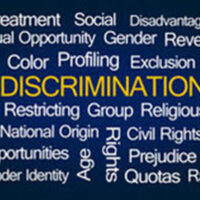Is my employer protecting employees against harassment and discrimination?

The Fair Employment and Housing Act (FEHA) prohibits discrimination and harassment in the workplace as well as retaliation. FEHA also creates an obligation on employers to prevent and correct such behaviors. FEHA applies to public and private employers, labor organizations, training programs, employment agencies, and licensing boards. An employer can be one or more individuals, partnerships, or companies.
California law protects individuals against discrimination in the following categories:
- Race
- Origin
- Religion
- Age
- Disability, mental and physical
- Sex, gender and gender identity and expression
- Sexual orientation
- Medical condition
- Genetic information
- Marital status
- Military or veteran status
The Department of Fair Employment and Housing (DFEH) is the state’s agency in charge of enforcing the provisions of FEHA and provides a guide to employers for the implementation of programs in compliance with FEHA.
What are the employer’s obligations?
- Implement a policy. The policy must be written, easily understandable and must be distributed and made available to all employees and should also be discussed in staff meetings on a regular basis. This policy must include a mechanism to handle complaints and conduct investigations. It must also be applicable to all levels of employees, including management.
- Provide appropriate training for supervisors and managers. FEHA requires at least a 2-hour training.
How must the investigation be conducted?
The investigation must be fair, follow due process and begin as promptly as possible following the receipt of the complaint. Below are the steps that employers should follow receiving a complaint of harassment or discrimination in the workplace:
- Interview the complaining party in person and thoroughly.
- Inform the accused party of the accusations and get their side of the story also in an in-person interview. The investigator must use discretion when deciding whether to disclose the identity of the accusing party.
- Interview relevant witnesses and review relevant documents
- Reach a fair and informed conclusion.
What actions does the employer need to take?
Upon finalizing the investigation an investigation that shows a misconduct took place, the employer must implement an appropriate remedy. It is important to note that the misconduct violates the policy or the law. The employer has the obligation to prevent and correct any inappropriate behavior. The employer can accomplish this by:
- Stopping the behavior before it rises to the level of unlawful;
- Imposing remedies appropriate and proportionate to the level of misconduct to avoid the misconduct being repeated; and
- Evaluate precedent on actions the company has taken in the past in similar situations. These remedies can include training, counseling, salary reductions, loss of a bonus, or even termination depending on the gravity of the misconduct.
If you have faced harassment or discrimination at your workplace or you have any questions about bringing up a claim, call the Los Angeles discrimination & harassment lawyer at Litigation, P.C. for a consultation.
See also The Attorney’s Quick Guide To Determining Which Claims Are Worth Pursuing
More from the DFEH:
dfeh.ca.gov/employment/#whoBody

